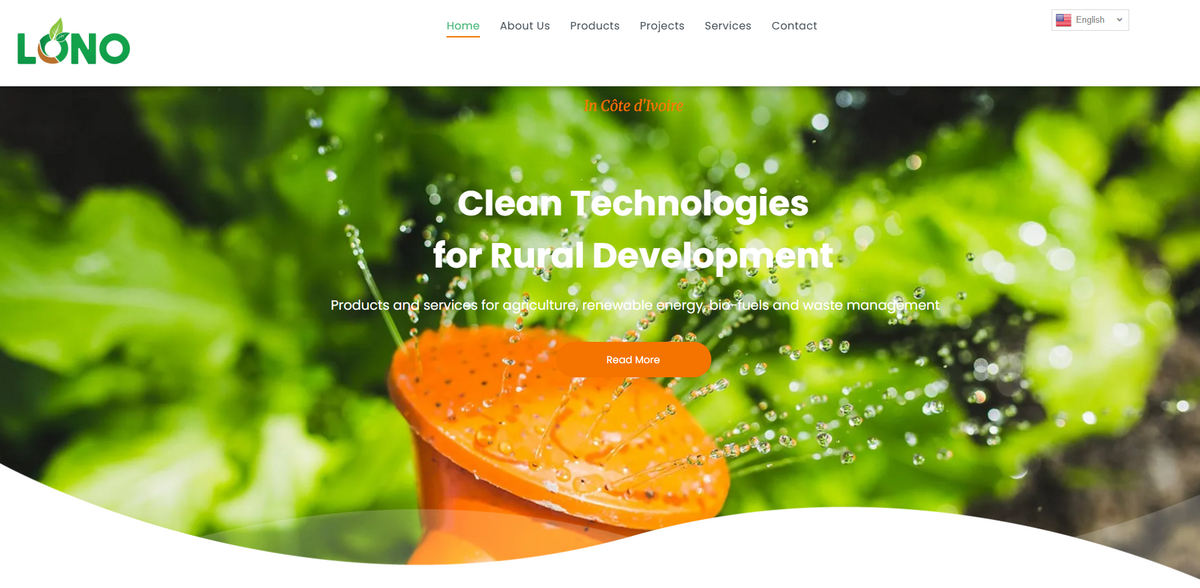What the Project Is
In Côte d’Ivoire, clean technologies are paving the way for rural development. LONO’s work spans products and services in agriculture, renewable energy, bio-fuels, and waste management… Their innovative approach is evident in the development of high-rate digestion solutions for waste treatment and energy generation for SMEs and off-grid communities. At the heart of this advancement is KUBEKO, a highly efficient composting tool adapted to the local context that reduces composting time to 4 weeks! The project seamlessly combines modern techniques with traditional needs, marking a transformative step for both urban and rural settings.
Main Benefits and Key Facts
A closer look at the benefits reveals a range of impressive achievements and practical figures:
- KUBEKO slashes composting time down to just 4 weeks.
- Green waste from agriculture or cooking is efficiently transformed into value.
- Renewable energy initiatives focus on biomass and solar energy to electrify rural areas as well as serve companies and organizations.
- Recognitions include being named in the Top 12 Innovations at VIVATECH 2018, FCIAD’s Soil Fertility Innovation Prize winner, and earning accolades like Total appointing LONO Startupper of the Year in Côte d’Ivoire.
- The initiative has attracted significant support, including its participation in the World Bank’s Accelerator Program and winning the second prize at EDF Pulse Africa Awards.
Waste Management & Sanitation Insights
The project shines in how it addresses waste management and sanitation challenges. LONO transforms green waste—whether solid or liquid—from everyday agriculture or cooking into something remarkable. With technology that cleans up and repurposes waste, natural by-products are turned into valuable resources. This approach not only reduces environmental burdens but also generates energy and organic fertilizers, efficiently closing the loop between waste and sustainability. It’s a solution that speaks to the needs of modern communities, blending innovation with local practices… a true game changer in waste sanitation!
Renewable Energy and Biofuels Focus
In addition to waste management, renewable energy forms a cornerstone of the project. LONO designs and implements renewable energy projects with a primary focus on biomass and solar energy. Whether powering rural electrification or serving forward-thinking companies and organizations, the energy generated is used onsite or even shared with nearby units. This localized energy generation not only builds resilience in rural areas but also contributes to reducing reliance on traditional and polluting energy sources. The integration of bio-fuels and solar power highlights the project’s commitment to a greener and more sustainable future.
The Mission and Vision Behind the Innovation
At its core, LONO champions the belief that all countries and communities deserve to benefit from innovation and technology. The mission is simple yet powerful: offer sustainable and affordable solutions to transform waste into value. By adapting existing technologies from wastewater and sewage sludge treatment for energy generation, the project addresses local challenges head-on. There is a clear vision where innovation meets practicality, ensuring that every solution is finely tuned to local contexts. It’s all about making clean technology accessible and impactful… a true revolution in the realm of rural development.
Project Impact and SDGs
- SDG 7: Affordable and Clean Energy – Empowering communities with renewable, locally generated energy.
- SDG 11: Sustainable Cities and Communities – Enabling integrated waste management and clean energy production in urban and rural settings.
- SDG 12: Responsible Consumption and Production – Transforming waste into valuable resources and promoting sustainable practices.
- SDG 13: Climate Action – Reducing environmental impact with eco-friendly technologies and practices.
- SDG 15: Life on Land – Enhancing soil fertility through innovative composting methods and green waste transformation.
Future Perspectives and Community Engagement
Looking ahead, the project continues to build on its considerable achievements. A Smart Village pilot for integrated waste management and clean energy production is now being trialed in various villages across Côte d’Ivoire. This forward-thinking initiative not only strengthens energy independence but also fosters community engagement and capacity building. Users are trained to maximize the benefits of on-site generated energy and the fertilizer by-product, ensuring a lasting, positive impact. With ongoing trials and promising results, the natural next step is a broader rollout, reinforcing a new, sustainable model for energy production and waste valorization. The dynamic, everyday application of these technologies inspires confidence in the future and sets a benchmark for innovations aimed at sustainable rural development.


















